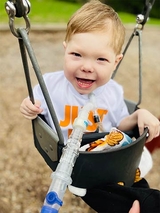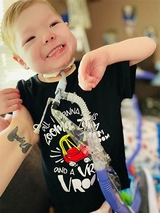A Long Road: Wyatt’s Journey From Complex Single Ventricle Heart Disease to Transplant
Wyatt was born in April 2019 with complex congenital heart defects. Doctors at his local hospital deemed it too risky to operate, and told Wyatt’s parents, Katie and Matt, nothing could be done for their son. But unwilling to give up, the family traveled from their home in Virginia to Children’s Hospital of Philadelphia (CHOP) Cardiac Center for a second opinion. A team led by Matthew O’Connor, MD, Medical Director of CHOP’s Heart Failure and Transplant Program, decided to take on Wyatt’s case.

As soon as Dr. O’Connor met Katie and Matt, he was impressed with how mom and dad immersed themselves in Wyatt’s care. “I don’t think I’ve ever encountered two more effective and dedicated advocates for their child,” he says.
Evolving treatment for a high-risk patient
Initially, Dr. O’Connor and his colleagues in the Cardiac Center recommended inserting a Blalock-Thomas-Taussig (BTT) shunt at 4 months of age, as a first surgery to stabilize his circulation until further decisions could be made regarding the best path forward to treat his heart disease. In January 2020, he had the second surgery, called the Glenn operation. After that surgery, Wyatt developed heart failure, and was hospitalized for more than a year. Dr. O’Connor and the team knew that further surgeries to repair his heart would not be successful.
The medical team regrouped. At first, Wyatt was considered a high risk for heart transplant because he had abnormal blood supply to his lungs. But a team of experts that included cardiologists, surgeons, imaging and cardiac catheterization specialists, nurse practitioners, social workers and others convened and ultimately concluded that Wyatt was a viable candidate. He was placed on the waiting list in June 2021.
A family of fighters

Wyatt did not respond to the maximum dose of milrinone, a heart failure medication, and it was not known when Wyatt would be matched for transplant. In July 2021, Katsuhide Maeda, MD, PhD, Director of Mechanical Circulatory Support and Surgical Director of the Heart/Lung Transplant Program, surgically implanted a VAD – a pump that, because of Wyatt’s small size, was situated outside of his body. Just one month later, a heart donor became available for Wyatt, and in August 2021, he received his heart transplant.
This road hasn’t been easy for Wyatt or his parents. Now 4 years old, Wyatt has spent most of his young life in the hospital. Matt stopped working so that he and Katie could both be present for Wyatt. They took turns staying in Philadelphia, more than a six-hour drive from home. Wyatt’s sisters, now 9 and 6, went months without seeing their little brother. “It was hard for them to understand why we couldn’t all be together as a family,” Katie says.
And the complications kept coming. In addition to his heart disease, Wyatt suffered from heterotaxy, which impaired his intestinal function and prevented him from tolerating feeds. Additionally, after the heart transplant, Wyatt’s kidneys unexpectedly started to fail.
At multiple points since Wyatt was born, his prognosis looked grim. In November 2022, he was sent home with palliative care. His parents prepared for the worst. But again, Wyatt surprised them. His kidneys spontaneously started working again. And despite some scary moments over the last few months when Katie says he got “really, really sick,” Wyatt continues his steady progress.
Through sometimes harrowing ups and downs, Katie says they’ve always followed Wyatt’s lead. “When our son was born, we were told he would not see his first birthday,” she said. “Last year, with all the complications with his kidneys, they said there was a zero percent chance of him ever leaving the hospital. But we brought him home. And even in the worst moments, it was like Wyatt was telling us, ‘Not yet.’”
Taking literal baby steps

Though Wyatt travels to CHOP less frequently now, Katie remains his full-time caregiver. She marvels at his progress. His kidneys and heart are functioning well. He soaks up “cuddles and hugs” from his big sisters. He’s taking his first steps, enjoys sitting in the grass and adores being in the water.
“Those things you once took for granted are things we now cherish,” Katie says. “Because of all the tubes and lines in his body, Wyatt didn’t have a tub bath for more than two years.”
Dr. O’Connor attributes the success of Wyatt’s treatment plan to the “deep expertise” and creative problem-solving across CHOP’s cardiology, nephrology, pulmonology and psychosocial teams, in caring for a patient who had “among the most complex” congenital heart defects he’s seen. But he reserves his highest praise for mom and dad, who were determined, every step of the way, to do all they could to give their son a chance to thrive.
“As much as I credit our team's persistence,” he says, “Matt and Katie did that one hundred times over.”